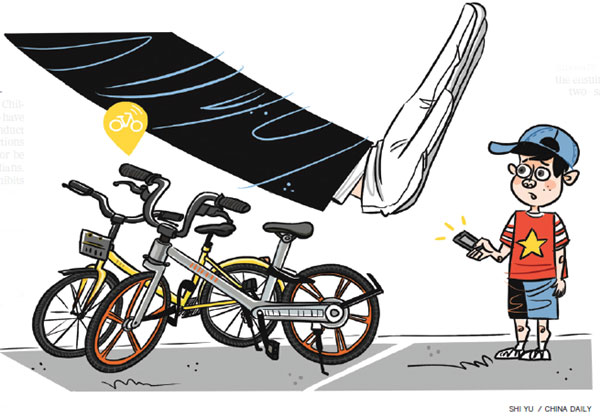Editor's Note: The parents of an 11-year-old boy, who was killed in a collision with a coach while riding one of Ofo's shared bikes in Shanghai in March, have sued the company and the coach driver, demanding 8.78 million yuan ($1.32 million) in compensation. They also want Ofo to replace its bike locks with smarter ones. Two experts share their views with China Daily's Cui Shoufeng. Excerpts follow:
Smarter locks cannot rule out accidents
Judging by the evidence available, the legal guardians of the 11-year-old, including his parents and school, should be primarily responsible for his death. Children of his age are deemed to have limited capacity for civil conduct and, hence, their civil actions should have the consent of or be ratified by their guardians. Besides, Chinese law prohibits children below 12 from riding bikes on public roads.
The coach driver's responsibility is comparatively less as the boy "stole" the bike by cracking the combination code to its lock and was riding on the wrong side of the road when the bus hit him.
The question then is: How much responsibility the bike-sharing company should shoulder?
The locks of many Ofo bikes are not difficult to open, because their four-digit combination code does not change after use and can be easily obtained. Perhaps that's why Ofo has been updating the old mechanical locks since March. The new, smart locks are harder to crack, but they have not yet been fitted to all Ofo bikes.
From the legal point of view, however, Ofo cannot be held responsible for the accident. And whether or not it has violated tort law should be decided by the cause of the boy's death. But if the locks of all Ofo bikes have design flaws and the boy cracked the combination code on one of them, Ofo should be held accountable.
Ofo might be exempted from blame, however, if it is established that the boy found the bike unlocked, because the violation of tort law consists of illegal acts and intentional mistakes. The company has moral and technological obligations, though, to update its products and pay compensation to the boy's parents. But accidents like this are not always foreseeable and cannot be avoided even after Ofo equips all its bikes with smarter locks.
Zhu Wei, deputy director of the Communication Law Center at China University of Political Science and Law
Customer safety more important than profit
Tort law aside, the flawed design of many Ofo bike locks should be enough to hold the company accountable. Indeed, the boy had limited capacity for civil conduct, and his legal guardians and society had the responsibility to prevent him from breaching the law and keep him safe.
The "pond drowning" principle could be of some help in the case, because it argues that if there is no fence around a pond and a child drowns in it, the pond owner has to pay compensation to the child's family for failing to fulfill his or her responsibility of building a fence, so as to prevent accidents.
Locks of many Ofo bikes that can be easily opened have been the cause of many accidents, including the one in Shanghai. Many know the combination code to open the locks can be used repeatedly and shared with anyone, including children below 12.
It is unlikely that Ofo has been unaware of its design flaws and the ensuing consequences. One or two safety related incidents could be considered "accidents", not a series of similar incidents. A month ago a 13-year-old boy died in Zhengzhou, Central China's Henan province, while riding downhill on an Ofo bike. And the mechanical lock had something to do with it, as some reports suggest the boy managed to crack it.
For Ofo and its rivals, competition must not override the importance of protecting intellectual property and customers' lawful rights. Enterprises should not fail in their duty to ensure the safety of their customers, especially the underage who are vulnerable to a slew of things.
Even if Ofo is exempted from legal responsibilities in the Shanghai case, its reputation could suffer a heavy blow if its bikes continue to have locks that can be easily opened. The legal and other authorities, on their part, need to adopt stricter standards for shared bikes.
Liu Yuanju, a researcher at Shanghai Institute of Finance and Laws

